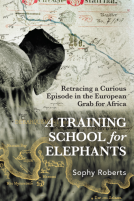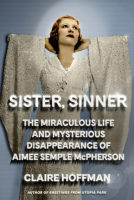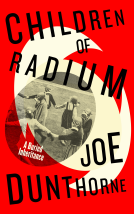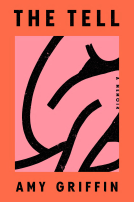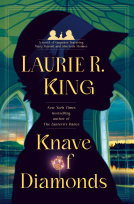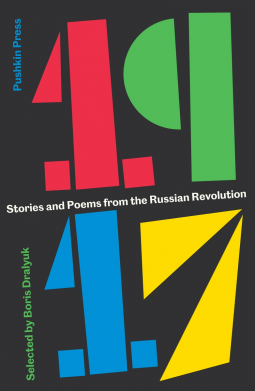
1917: Stories and Poems from the Russian Revolution
by Various Authors
This title was previously available on NetGalley and is now archived.
Send NetGalley books directly to your Kindle or Kindle app
1
To read on a Kindle or Kindle app, please add kindle@netgalley.com as an approved email address to receive files in your Amazon account. Click here for step-by-step instructions.
2
Also find your Kindle email address within your Amazon account, and enter it here.
Pub Date Dec 13 2016 | Archive Date Oct 26 2016
Description
Edited by Boris Dralyuk, the acclaimed translator of Isaac Babel's Red Cavalry (also published by Pushkin Press), 1917 includes works by some of the best Russian writers - some already famous in the English-speaking world, some published here for the very first time. It is an anthology for everyone: those who are coming to Russian literature for the first time, those who are already experienced students of it, and those who simply want to know how it felt to live through this extreme period in history.
POETRY:
• Marina Tsvetaeva, 'You stepped from a stately cathedral ', 'Night. - Northeaster. - Roar of soldiers. - Roar of waves.'
• Zinaida Gippius, 'Now', 'What have we done to it?', '14 December 1917'
• Osip Mandelstam, 'In public and behind closed doors'
• Osip Mandelstam, 'Let's praise, O brothers, liberty's dim light'
• Anna Akhmatova, 'When the nation, suicidal'
• Boris Pasternak, 'Spring Rain'
• Mikhail Kuzmin, 'Russian Revolution'
• Sergey Esenin, 'Wake me tomorrow at break of day'
• Mikhail Gerasimov, 'I forged my iron flowers'
• Vladimir Kirillov, 'We'
• Aleksey Kraysky, 'Decrees'
• Andrey Bely, 'Russia'
• Alexander Blok, 'The Twelve'
• Titsian Tabidze, 'Petersburg'
• Pavlo Tychyna, 'Golden Humming'
• Vladimir Mayakovsky, 'Revolution: A Poem-Chronicle', 'To Russia', 'Our March'
PROSE:
• Alexander Kuprin, 'Sashka and Yashka'
• Valentin Kataev, 'The Drum'
• Aleksandr Serafimovich, 'How He Died'
• Dovid Bergelson, 'Pictures of the Revolution'
• Teffi, 'A Few Words About Lenin', 'The Guillotine'
• Vasily Rozanov, from 'Apocalypse of Our Time'
• Aleksey Remizov, 'The Lay of the Ruin of Rus''
• Yefim Zozulya, 'The Dictator: A Story of Ak and Humanity'
• Yevgeny Zamyatin, 'The Dragon'
• Aleksandr Grin, 'Uprising'
• Mikhail Prishvin, 'Blue Banner'
• Mikhail Zoshchenko, 'A Wonderful Audacity'
• Mikhail Bulgakov, 'Future Prospects'
Available Editions
| EDITION | Other Format |
| ISBN | 9781782272144 |
| PRICE | $14.95 (USD) |
| PAGES | 236 |
Featured Reviews
 Reviewer 201788
Reviewer 201788
In college I took a class in Russian Literature of the Silver Age. This is the period of the late 19th/early 20th century when Russian literature reached impressive creative heights. It was such an enlightening course, and introduced me to many of the names that come up in this collection: Tsvetaeva, Mayakovsky, Gippius, Blok, Bely, Gumilev, and of course, Akhmatova - all the regulars, once you're familiar with the period. It also inspired in me a deep love for any writing coming out of this era, so much so that my heart really does skip a beat when I read or see anything connected to it, like with this title. I hope this collection might bring that passion for this literary sphere to other readers. It's an excellent sampling of selected works of all of the luminaries I mentioned and many others, both household names even in the English-speaking literary world (Pasternak, Bulgakov) and the lesser known but influential.
The editor, Boris Dralyuk, acts as a curator and separates the pieces thematically, singling out common themes that relate to the works of this period and tie to the historical events the authors found themselves living through. Each section begins with some academic background providing context for what was going on and about the authors themselves - their specific kind of work, connection to the revolution and its events, perception of their work. This makes the collection very accessible even to anyone who has zero background or previous knowledge of the era or this type of literature.
I was interested in reading it for the poetry, to see some different translations of pieces I already knew and hopefully come across some new ones, but the prose was excellent as well. The Remizov and Bulgakov pieces are completely excellent. In addition to much of that particularly Russian sense of dark gallows humor paired with the ridiculous, I noticed the theme, over and over, of Russia as a distinct personality and the authors in mourning for what has been suffered and endured with hopes for healing and a return to normalcy in the future. There's a strong, often uneasy sense of foreboding in every selection here, knowing as we do what was still to come. But this collection is so evocative of the time, the fear and uncertainty and the kind of anticipatory electricity in the air before a storm.
I would've liked a little more emphasis on poetry - sometimes after reading the introductory section buildup I was disappointed when there were just a couple of poems in the section. But it's also because I'm in love with poetry of this era and always want to read more and different translations. A great collection for both the newly curious and familiar readers in time for the 100th anniversary of the Russian Revolution.
 Joseph S, Reviewer
Joseph S, Reviewer
1917: Stories and Poems from the Russian Revolution edited by Borris Dralyuk is a collection of Russian writing from the start of the revolution. Dralyuk is the Executive Editor of the Los Angeles Review of Books. He is a literary translator and holds a Ph.D. in Slavic Languages and Literatures from UCLA, where he taught Russian literature for a number of years. He has also taught at the University of St Andrews, Scotland.
Through the 1930s to the fall of the Soviet Union, many writers both inside and exiled from the Soviet Union wrote about the system. Solzhenitsyn's We Never Make Mistakes, Ayn Rand's We the Living, Katayev's Time, Forward, and Babel's Red Cavalry all tell of the Soviet state after it had been established. There is plenty of literature both pro and anti-Soviet written after the state had been created. Dralyuk, however, chooses stories and poetry from 1917 and the Russian Civil War.
Many people do not realize that there were years of civil war between the abdication of Nicholas II and the establishment of the Soviet Union. There is little doubt that the people of Russia wanted change. Flair ups of revolt were a regular part of late Czarist Russia -- Alexander II's Assassination, 1905 Revolution, resistance to WWI. The people wanted change. They demanded change, but the change they found was not what most wanted. Russia was a country where the majority of the population was uneducated. When the Bolsheviks took power in 1917 38% of the male population was literate and only 12.5% of the female population was literate. Russia was a very backward country at the time and the thought of revolution from below seems very improbable.
The poetry and prose reflect this. One writer tells of a street revolutionary yelling to the crowd not to allow “Ann Exations” back into the country. The writer, Teffi, explains the speaker believed annexation was a woman. Likewise, an old woman prays for the 'reactionary hydra" who might raise its head again. The descriptions of the "Wine Riots" show the level of the common person in Russia. It might seem unbelievable but then too almost 1,400 people died in a stampede for free beer at the coronation of Nicholas II. What many expect is hyperbole was reality in Russia. When hyperbole is used it seems to be something from one's wildest imagination. Teffi also writes a story called "Guillotine", dedicated to Trotsky, tells of Russians facing the guillotine in typical Russian fashion, complaining while standing in line and fighting their way to the front.
Not everyone was against the revolution. Mikhail Gerasimov shows the hope of revolution -- "Fed by the dream of Communism I stoked the furnace with new power, intoxicated by its rhythm, I forged iron flowers." Mayakovsky writes of the glories of the revolution. Another writes that among the peasants and soldiers the conversion from Orthodox Christianity to socialism and atheism was as easy as splashing fresh water on themselves in a bath house -- a new baptism and new faith easily accepted.
Russia is a country that one writer called “Cain’s land” rather than the favored Abel’s land. Dralyuk captures this aspect of Russia by putting together a collection literature encompassing both sides of the Russian Civil War and the chaos that ensued. It is easy to look back at history and write about it. Here writers and poets wrote something akin to live reporting the civil war. Many times we look back at history and wonder, “What were they thinking?” Dralyuk actually shows us what the people were thinking. Perhaps one of the most famous writers to grow out of the period describes the chaos that became Russia. “And so, while over there in the West resounds with the clatter of the machines of creation, our country resounds end to end with the clattering of machine guns.” ~ Mikhail Bulgakov
<b>4,5 stars.</B>
I'm a bit like Bob Dylan at the moment. Speechless.
A wonderful collection of excellent prose.
I'm not a regular non-fiction & anthologies reader. But I enormously enjoyed this collection.
I saw some names that mean a lot to me, and I became curious. Russian Soviet classic in English? Why not? The end result: I stayed AWAKE the half of the night. I was hooked, I was amazed, I was proud to be able to read ALL of these authors in the original language.
And OMG how UP TO DATE these stories are!..
And I STILL learned a lot.
Boris Dralyuk made a great job. The important historical facts that give insights into this turbulent and fateful period of time, and brilliantly chosen literary fragments...WOW.
 Mandy J, Reviewer
Mandy J, Reviewer
Exactly what it says it is – a collection of poetry and prose written by leading Russian authors at the time of the 1917 revolution. Comprehensive and varied, well-translated, and certainly a treat for Russian literature enthusiasts, it’s also an accessible and enjoyable anthology for those less well acquainted with the writers featured.
 J E, Reviewer
J E, Reviewer
The amount of historical context provided in this collection really allows the reader to understand the motivations and feelings of the various movements happening around that time. The book covers multiple perspectives, allowing the reader to see both sides of a contentious moment in history.
“Every pickpocket who takes a wallet from some heedless passer-by can now say that he’s a follower of Lenin.”
“Why not? Lenin takes somebody else’s house, a pickpocket takes somebody else’s wallet. The only difference is one of scale. After all, great ships need deep waters.” (Teffi)
Welcome to 2017, a year to mark the 100 year anniversary of the Russian Revolution. It’s perhaps then not surprising that the ever innovative Pushkin Press should mark the occasion with a very special book: 1917: Stories and Poems from the Russian Revolution. Editor Boris Dralyuk concentrated his selections on the period between February 1917 and late 1919 with the aim “to steep the reader in its tumult-to recreate that heady brew of enthusiasm and disgust, passion and trepidation that intoxicated Russia and the world as events unfolded.”
1917
Contents:
The Revolution: A Poem Chronicle
Stolen Wine:
Marina Tsvetaeva
Zinaida Gippius
Osip Mandelstam
A Distant Voice:
Osip Mandelstam
Anna Akhmatova
Boris Pasternak
Wake Me Tomorrow
Mikhail Kuzmin
Sergey Esenin
Iron Flowers
Mikhail Gerasimov
Vladimir Kirillov
Alexey Kraysky
Purifying Fire
Andrey Bely
Alexander Blok
Titsian Tabidze
Our March
Vladimir Mayakovsky
Prose
The Break
Alexander Kuprin
Valentin Kataev
Alexander Serafimovich
Dovid Bergelson
Teffi
Vasily Rozanov
Alexey Remizov
Of Dragons and Men
Yefim Zozulya
Yevgeny Zamyatin
Blue Banners and Scarlet Sails
Mikhail Prishvin
Alexander Grin
Future Prospects
Mikhail Zoshchenko
Mikhail Bulgakov
One of the important aspects of this collection is that these pieces were not written with hindsight; they were written at a very specific moment of history, capturing the transient feelings of those times. Not only does this collection gather together the most important creative voices of the period, but each section gives a short bio of the writers–along with their fate (so few lived to old age.) I had intended to write a short description of what happened to each writer before I came to this review but the editor did this in the book, and shows, effectively how writers of such amazing talent were killed or displaced–an entire generation swept off the map.
I won’t review every piece–some given the outcome of the Russian revolution and subsequent civil war are extremely painful–but instead I’ll say that by far my favourite is Kuprin’s story (perhaps not too surprising since I loved The Duel.) Kuprin’s tale Sasha and Yasha: An Old Story is an incredibly moving piece in which we are left to wonder what happened to the characters whose photographs are in an old album:
It feels like none of it ever existed: the glorious army, the extraordinary soldiers, the heroic officers, our dear, good, carefree comfortable Russian life… The old album’s pages tremble in my hand as I turn them.
Teffi presents a frightening picture of Russian society with her vicious little story The Guillotine, and in her piece, A Few Words About Lenin (1917), she presents an unflattering portrait of the man and his ideology.
He sensed nothing, predicted nothing. He knew nothing but what he’d been stuffed with: the history of socialism
Yefim Zozulya’s story, The Story of Ak and Humanity augurs the Red Terror yet to come with the commodification of the individual.
Those whose existence is found to be superfluous will cease to exist within 24 hours.
I loved Alexander Grin’s story, The Soul’s Pendulum, a story in which a man sees the revolution as one of history’s “exhilarating and magnificent upheavals.” Valentin Kataev’s story The Drum focuses on a group of cadets–one in particular whose greatest concern in life is getting some extra time with his sweetheart, but everything changes when the news arrives that the Tsar has abdicated. Alexander Serafimovich’s story How He Died is also incredibly moving even though it’s initially heavy-handed and clear that the author was a Bolshevik. This is a wonderful collection that provides many pointers for those who wish to expand their knowledge of Russian literature, but readers are best advised to come to the book with some idea of the history of the period.
A poem by Blok (linked to poem on youtube)
Review copy
